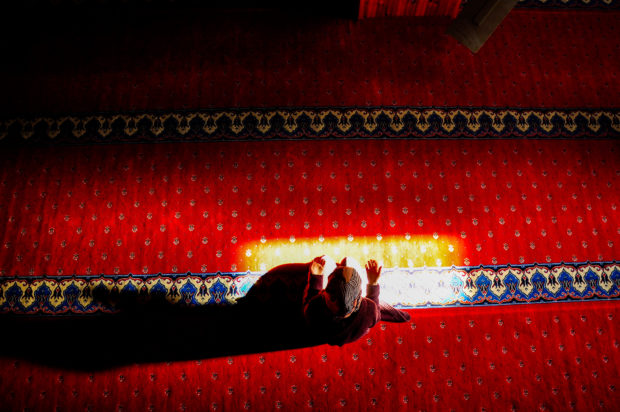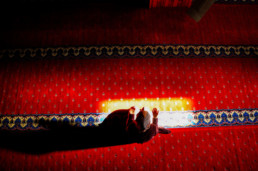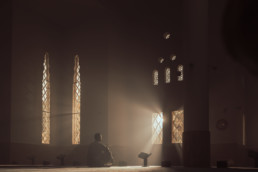Engraving God Upon the Heart
The act of engraving is deliberate, repetitive, and slow. It takes time to form even a crude surface outline, to say nothing of making it presentable, or even beautiful. You must make the same motion over, and over, and over (and over) again, patiently taking away a small piece of material each time. It becomes trance-like. But you must remain focused on the task, and not be robotic in your actions. No matter when you finish, there is the feeling that you can refine it, sharpen the image, remove some abstraction from your finished artwork.
The act of engraving the name of God upon your heart is no different to the Sufi.
Sufism is a branch of Islam that emphasizes spirituality and mysticism. Having a close and loving relationship with the Almighty is one of the chief goals of the Sufi, beyond just slavishly following the divine laws set forth in the holy books. It is a deliberate act to embrace Him.
The Naqshbandi Order of Sufism derives its name from two Farsi words, first “to engrave” (naqsh) and then to form a bond “bandi.” According to Madani Sheikh, a devotee of The Most Distinguished Naqshbandi Sufi Order of New York and New Jersey, this refers to carving the name of God upon the heart of the Sufi while forming bonds back to their spiritual teachers (called Mawlana, “Our Master”).
In order to carve the name of God onto their hearts, Sufis sing chants and meditate upon the words they hear, over and over and over again. One of the hymns they sing, The Opening Qasida, has 24 verses that each begin with “Yā Rabbi sallī ‘alā Muhammad” (“O Lord, bestow blessings upon Muhammad”). Another is 64 verses long, and takes over 10 minutes to sing.
A unique part of the Sufi worship is done towards the end of the service, after the night prayers are finished. Worshippers form a ring on the rugs they have carefully laid out on the floors, facing each other. As with all other parts of the service, the women and men sit separately. The faithful close their eyes, cross their legs, and place their open hands upon their knees, palms facing upwards. They wait silently, patiently, for their leader, Shaykh Diomande Soulieyman, to begin the chants.
At Soulieyman’s direction, Sheikh stood up, walked over to the light panel, and darkened the room. Only a few lights in the massive space were left on, just enough to illuminate the exits. The Sufis were shrouded by the darkness.
Soulieyman began to sing. He sung minutes-long verses that repeated four or five times apiece, his tone rising and falling. In the dim light, the Sufis swayed gently in time to his melodies. As the Shaykh sung into his microphone, connected to a powerful sound system, his followers could hardly be heard singing alongside. On the rare occasion he takes a breath though, their voices come through clear and harmonious.
The air of the darkened room was filled with their meditative chants. It did not matter that there were only 30 Sufis here, nor that they had to worship in an Episcopal Church on 28th Street because they had no Mosque of their own. It did not matter. For the moment, this was not a place of pulpits and altars, not one of a small community in a big city, not even one of sight. This was a place for God.
After 45 minutes, the chants slowly faded out with a long, mournful note. Sheikh quietly rose again and turned on the lights, which felt almost jarring after the extended trance of the meditation. The worshipers took each cupped their hands and brought them to their face as if splashing themselves with water. They had received God’s blessings through their meditation, and were spreading His gift over their skin.

Soulieyman delivered a brief sermon, less than 10 minutes long, and everyone rose from their seated position. The service was over, and now it was time to share a meal.
They shared kabobs and lentil soup with lamb, drank a pineapple-ginger juice popular in West Africa, and chatted about life. They hadn’t been able to meet the week prior due to a snowstorm, and a few of them commented on how pronounced the absence felt after just a week. After such a powerful, transcendental experience in the dark, it’s hard to imagine missing even one service. The engraving on their hearts was made a little deeper that evening.
No Compromise In Obedience
Ask one million people how they feel about COVID-19 lockdown measures, you will get 1 million strong opinions. Ask a Sufi what they think about lockdown, and you will get a reserved and resigned response.
“Obey Allah, obey the Holly Prophet Muhammad, and obey those who are authorities. This is the basis of our life.” This is the guidance of Shaykh Diomande Suleyman, leader of The Most Distinguished Naqshbandi Sufi Order in New York/New Jersey. “Those authorities can be male; they can be female. They can be president, they can be governor, they can be a health director, a police officer, a supervisor – whoever is in that position of authority, you must obey that person.”
Obedience is a key part of being a Muslim and Sufis have raised this attribute to something of an art form. In the four stages of Sufism, the first two stages – sharia, the religious laws, and tariqah, the inner mystical path – govern how to live your life outward and inward to achieve spiritual enlightenment. Their literal translations from Arabic both refer to a type of pathway that must be followed in order to achieve the higher stages of truth and knowledge. Following the rules is foundational to Sufi spirituality.
According to Suleyman, you cannot pick and choose who you listen to and which rules you will follow. When the rules from different sources of authority conflict, it is the duty of the faithful to try and make them work together as best as possible. You can draw from the Quran, Islamic Scholars, government guidelines, and Allah himself when trying to arrive at the best compromise, but the rules must be followed.
Suleyman made it clear why following the rules, all the rules, is so important, especially in a time of pandemic. “All life is sacred. You have to save a life! So, by not coming to worship, it’s not something you choose or you like. Because God says life is sacred, we have to save it. You save lives by respecting the restrictions the authorities put in place.”
Still, there is an element of worship that cannot be captured at home, and no amount of justifying why a rule was put in place can overcome the sense of loss that follows. Zoom meetings are fine for passing a sermon, and the musical poetry of the Qasidas can be found on any platform that allows audio uploads. It’s ok – but it cannot capture the power of a zikar meditation in the dark, surrounded by the voices of other practitioners. You cannot pass the warmth of a shared meal through a screen as easily as you could a plate of food to a person beside you. Worship is about community, and the digital realm can only take you so far into the spiritual realm.
The Most Distinguished Naqshbandi Sufi Order had to abandon in-person worship in March of 2020, just like most other houses of worship around the United States. . Despite the yearning for their shared community, the members dutifully stayed apart for 15 months until the authorities told them they could return. They masked and sanitized as they were told, and refrained from shaking hands, an important part of establishing a connection to each other. Now, nine months later, they were able to worship with few restrictions. They could even share a meal again.
Speaking privately, Suleyman explained why he didn’t mind the lack of physical connection at first. “If you wear a nice perfume, and I sit near you for one hour, what happens? I will smell like it! When we sit together, the goodness is like a contagious disease. It jumps from one person to another person.” His measured and steady voice did not waiver as he made the analogy, but the barest hint of wry smile crossed his face as he let the comparison sink in before moving on. “One good person in the room means the whole group gains from that individual.”
As restrictions begin to ease in New York, the Sufis allow themselves to become closer physically and spiritually once more. Whether the rules change again or the path ahead becomes unclear, they know to accept and obey what they are told. For now, they revel in the spread of the spirit while the spread of COVID dies down.


